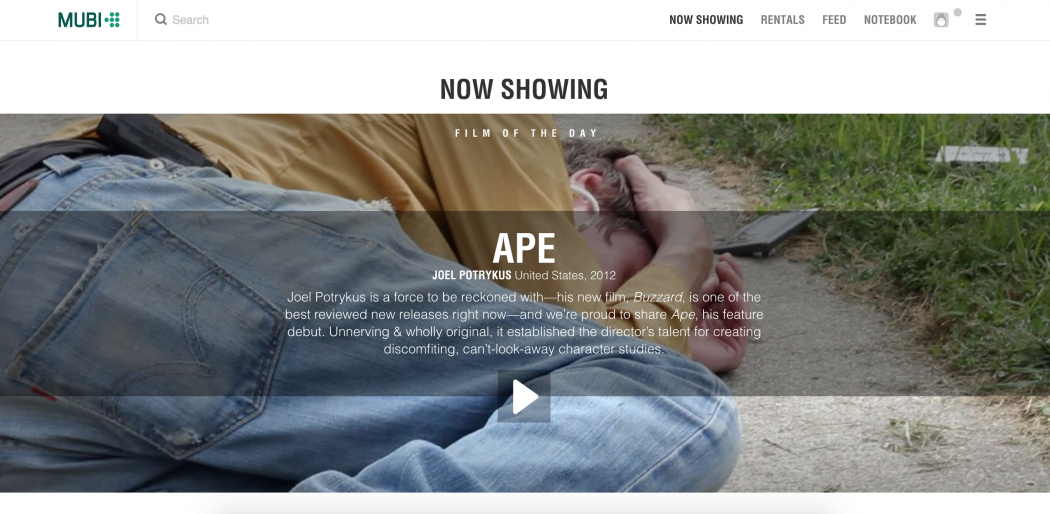The Best Free Film Streaming Service You’ve Never Heard Of
Mubi is a website that will change the way you watch films. Tailor made for cinephiles, it’s a social network/streaming platform/newspaper hybrid for anyone who despairs at the state of Netflix and prays one day for Filmstruck to come to Canada. It’s introduced me to many films and writers that have left an indelible mark on me, and soon it will do the same for you.
Mubi always has thirty films available to watch, and every day they get rid of one and add a new one, like an endlessly flowing river of cinema. These films are curated by a highly-trained team of academics and film snobs, so you can be sure that you’ll never get stuck in a streaming rut, watching half of an Adam Sandler exclusive before giving up and rewatching The Office. Indeed Mubi is sort of an anti-Netflix by its very design: There is no rewatching since all films must leave, and there is no binge-watching, since there are no series and the films tend toward the slow and artsy.
The current Mubi offerings are a good microcosm for the content they usually curate: they cover a range from the centre to the fringe, from Hollywood comedies to Thai essay films, from the academy to the bargain bin. They’re currently showing the Anne Hathaway drama Rachel Getting Married (from all-time-great filmmaker Jonathan Demme), award winning foreign films like A Separation (Asghar Farhadi), L’Enfant (Jean-Pierre & Luc Dardenne), and The Secret In Their Eyes (Juan Jose Campanella), but also a banned Georgian film from 1984 called Repentance, an animated short film called Pussy, and an experimental Thai essay/memoir film called Ashes. They just finished a series on the works of Krzysztof Zanussi (never heard of him? No shame, neither had I) and are starting another on Mati Diop. You will discover more about cinema on Mubi than anywhere else on the internet, guaranteed.
If Netflix was designed to reinforce what you already like ad infinitum, Mubi, by its design, was created to teach you, to mold you into a better film fan
Thankfully, once a film is gone from the feed, it’s not gone forever. You can always pay to watch a film from Mubi’s massive library if you miss it ($4 for an HD stream, a dollar less than Amazon). And beyond just being a curated streaming platform, Mubi is also a social network, where you can rate films (all films, not just the ones currently there), review them, make friends, follow others, and keep track of what you watch to get personalized recommendations. It’s a lot like letterboxd, another film-focused social network (that I love), but you don’t even have to leave the site to watch the movies.
There’s another critical aspect to Mubi: the notebook. It’s Mubi’s official feed of film writers who run reviews, interviews, essays, features, like any other film blog site. Some of my favourite critics, including Kelley Dong and Adam Cook, write for it regularly, and Ignatiy Vishnevetsky got his start there. The reviews are erudite, thoughtful, and run from recent releases to the films that Mubi currently offers, plus much, much more. I’ve learned more about cinema from the Mubi notebook than I could’ve possibly predicted. The reviews are always surprising, and always offer a different perspective than what you find anywhere else on the internet. If Netflix was designed to reinforce what you already like ad infinitum, Mubi, by its design, was created to teach you: to mold you into a better film fan.
“This sounds too good to be true,” I can hear you say, through my computer screen, “sobut it must cost an arm and a leg.” Normally Mubi would cost five dollars a month (chump change!) but just recently, if you have a McGill email address, you can access it for the low, low price of free. A bountiful buffet of film awaits you on the following link: Click away my friends, and let the cinema flow through you.








